Pyewacket wins Puerto Vallarta Race
Published on March 1st, 2024
With three staggered start dates on February 22, 23, and 24 for the biennial San Diego to Puerto Vallarta International Yacht Race, better winds on a start date can significantly impact overall results. But for the 2024 edition, not so much.
For the fastest boats starting on the final day, their outlook looked grim as they exited San Diego Bay with little wind, but a lot can happen along the 1000nm course to Puerto Vallarta, Mexico. After many sail changes, cursing grib files, running weather models, and pressing the boat when the ‘park up’ was over, the top seven overall came from that grim beginning.
Leading all 22 teams was perennial performer Roy P. Disney’s Andrews 68 Pyewacket (above) with his crew of Scott Easom, Torben Grael, Peter Isler, Brad Jackson, Robbie Kane, Ben Mitchell, Tony Mutter, Gary Weisman, and Daryl Wislang. Completing the top five was RP 52 Vitesse, RP 51 Zero Gravity 51, D/K 68 Peligroso, and the Bakewell White 100 Rio100.
Still, looking back, the 2020 Puerto Vallarta race showcased a sled-killer Hobie 33 Sizzle helmed by World Champion Bill Hardesty linking the evening thermals all along the Baja beaches while his larger competitors were parked up further out to sea for an overall win. So there is always hope for the smaller boats that start early!
Event information – Race details – Results – Tracker
Here’s how the 2024 PV Race came together:
ORR 6
Barry Clark’s Grand Soliel 44 Blackwing lost their internet connection early on in the race, and had the unique position of sailing at the front of the fleet without the ability to find their competition on the course until each day’s 0800 report. But there’s something to be said for having an open slate on the race course to make unbiased decisions and sail the race your way, as they cruised to a Class 6 victory.
ORR 5
With different leaders throughout along the coures, it was Jim Puckett’s Farr 57 Amazing Grace that finally sailed away from their competition on the southernmost route around the Baja Peninsula and into the finish.
Said Puckett, 24 hours prior to finish: “It’s been a great race so far, despite challenging and sometimes frustrating light-air conditions during the early part of the race. The last few days have provided a great reminder of why we do this. Blasting downwind in 20 knots under full sail, seeing these stunning sunsets and moon rises, power-reaching across the Sea of Cortez, we are having an amazing time on Amazing Grace.
“We took a bit of a gamble going well south of the cape, but the low track we’ve chosen just might be paying off. The crew has been working very hard doing lots of sail changes, mostly at night it seems (isn’t that always the way) and stacking every single sail on the boat on the windward rail for the final reach to the finish line. Regardless of where we end up on the leaderboard, we will have given it our very best effort. And we are having a blast.”
The gamble was to sail south prior to the approach to Cabo, in fact the most southern route across the Sea of Cortez in the entire fleet this year, to see if they could avoid the wind hole that loomed ahead. The initial standings check had dropped them to 4th in class and seemed like the mistake would cost them all their prior gains. But over the next 36 hours they quickly saw their competition’s speed dropping while their own line to the finish remained consistently strong. Their winning tactical gamble was uniquely satisfying.
ORR 4
This fleet had the closest race from start to finish where Tom Camp’s Santa Cruz 50 Trouble posted a narrow 3 minute corrected time win over Dave Moore’s Santa Cruz 52 Westerly. It was a waiting game for Westerly after their finish, and as the minutes ticked away, Trouble sailed the last few miles in nice steady afternoon winds generating boat speeds consistently 7+ knots that allowed them to eclipse Westerly’s time.
ORR 3
This fleet produced two of the top three overall boats with Thomas Furlong’s RP 52 Vitesse winning the Class and 2nd overall followed by Ivan Batanov’s RP 51 Zero Gravity 51 correcting out an hour behind Vitesse for 2nd in class and 3rd overall. This was Furlong’s first Puerto Vallarta Race with Vitesse.
“Us Saturday starters had a very challenging start,” said Furlong. “We actually did a really great start, by getting out of the harbor first, passing the Coronados first, and then we all kind of parked up again.
“It was that kind of race all the way down. “Every time we kind of felt like we were getting going and stretching out, we would collect back up and had several days where [our competitors] were literally stacked up a few miles away.
“We had some beautiful sailing conditions, 10 knots of breeze with flat water, it’s pretty nice sailing. The full moon was great, and two nights ago we had really nice sailing [with boat speed] in the teens, a top speed about 20. It’s really a hard tactical and strategic race. We had good crew work, the boat performed great. But trying to manage this year’s conditions was really challenging.”
ORR 2
Pyewacket sailed the least number of miles to complete the course (1092 nm, 25 miles fewer than the race average). In fact, it’s the same number of miles sailed by the same Andrews 68 Pyewacket in 2018, the last time Roy P. Disney won this race. Disney is now a record 4-time PV Race Overall winner (1992, 1998, 2018, and 2024).
“PV 1992 was our first race on our new Santa Cruz 70, where we finished in front of the hotels, with a harrowing finish,” recalled Disney. “We passed on both sides of the bay multiple times [to reach the finish]. In ‘98 we sailed a brand new RP 75 which was a great fast boat. And for all of these wins, our common crew have been Ben Mitchell, Gary Weisman, Scott Easom, and Robbie Haines.
“This is a challenging course especially rounding Cabo which can be impossible at times, with hundreds of choices. It seems only one or two boats get it right each time. This year was hard because we had two weather models completely different up to the morning of the start then no clear resolution of the weather after that. We should be back for the next race, we love PV.”
In 2022, the Pyewacket team set the course record on the Volvo 70, at 3:04:38:02. So what’s more satisfying, racing 3 days to set a course record without the corrected time success, or sailing 5 days and winning the corrected time race?
“Each is satisfying and rewarding in its own way and for its own set of reasons. What I would say is a record means more time in PV!”
ORR 1
Manouch Moshayedi’s Rio100 doubled up in the 2024 PV Race as not only the first to finish (elapsed time winner) but also corrected time winner in Class 1. Pre-race weather predictions didn’t necessarily lend themselves to optimal conditions for the Rio machine, but the benefit of sailing the fastest boat in the fleet is when the conditions are right you can fly across the course and limit the amount of time where you can get stuck since you owe so much time to all the other boats.
When Rio finished in the morning, and with initial predictions for solid winds through the night for the rest of the fleet, it appeared that BadPak and GoodEnergy would eat up the owed time from Rio. But the wind didn’t cooperate, and time ran out as the Class 1 competitors couldn’t get to the line in time to beat Rio.
“The first night we sat for about 4 hours with zero wind, zero, zero, zero,” shared Moshayedi. “Fortunately the last day, the last 24 hours helped us out and it was quite windy, 22-24 knots of wind and our top speed was over 27 knots.”
Event information – Race details – Results – Tracker
RECORD: Roy P. Disney and the crew of Pyewacket 70 set the monohull record in 2022 with a time of 3:04:38:02.
Source: SDYC

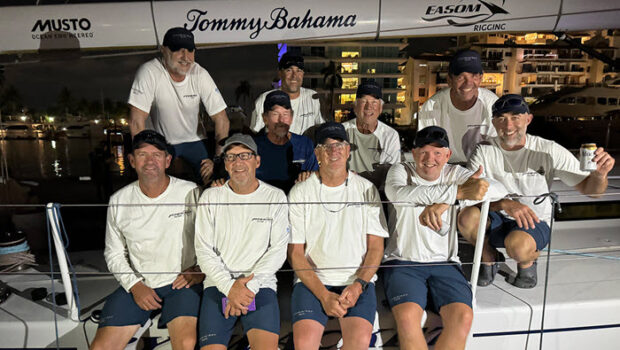


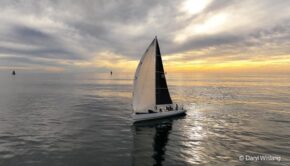
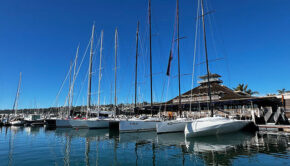
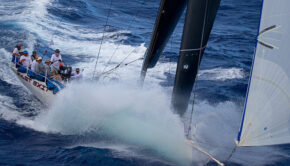
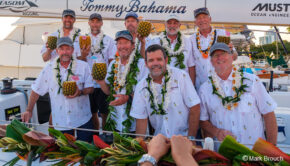
 We’ll keep your information safe.
We’ll keep your information safe.